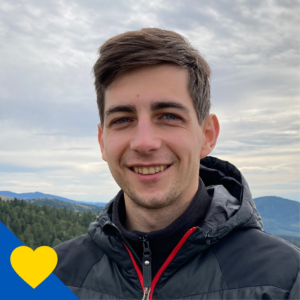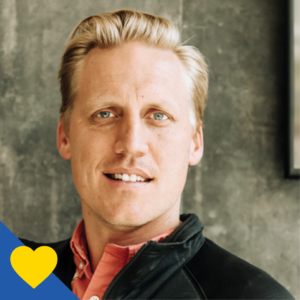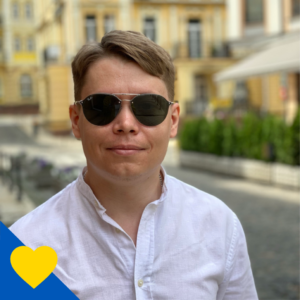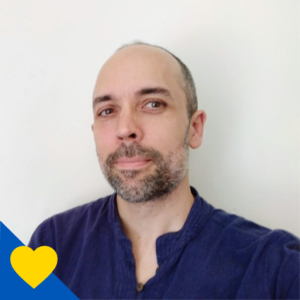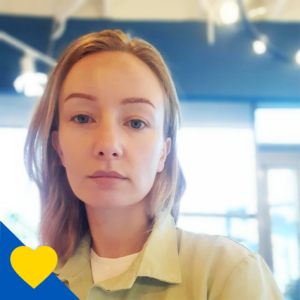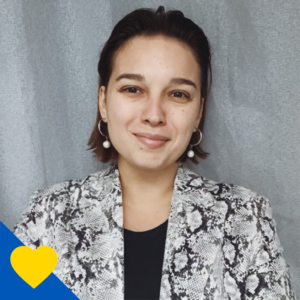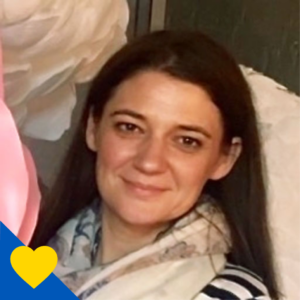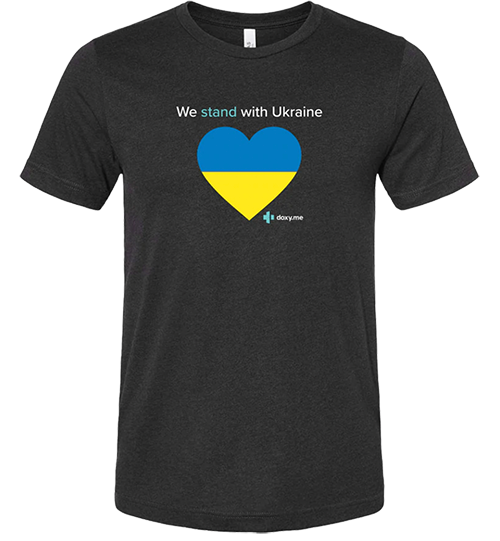
Heroes of Doxy.me: A Brit Volunteering in Ukraine
When Russia invaded Ukraine, James decided he should help however he could. His decision would take him on a long and eventful journey into Ukraine, where his real challenges would begin.
View Episode Transcript
Alex:
All right. Welcome James. We have, we have a very special guest today. James, could you go ahead and tell the audience a little bit about yourself because you are not a doxyme employee, nor are you a Ukrainian?
James:
No, that’s right. Thank you for having me, I guess. First of all, so I’m James I’m from the UK and I very randomly became part of, I guess, the doxyme family unofficially when I came over to Poland on the, what, the 3rd of March or something about six weeks ago or so, and again, very, very randomly. I met Brandon who then I basically, there’s a long story behind it, but we then traveled together to Ukraine to meet his team in Leviev. So yeah, that’s, that’s kind of how I’ve become part of this doxyme story journey, whatever you want to call it.
Alex:
Yeah, absolutely. And so Brandon of course, is the CEO of doxyme. How could you tell us a little bit more about how you guys kind of stumbled into each other?
James:
I kind of wish I could, but nobody really knows it’s it’s got lost. I basically somehow got in contact with Heath who I believe is Brandon’s the head of tech from my understanding. And so I, I must know somebody who knows him, who put us in contact and for the life of me, I can’t remember. He can’t remember. And Brandon can’t remember, so we don’t really know who this person is, but somebody somewhere put us in contact. And then he said, oh, well, Brandon’s actually flying over to Warsaw later on today or tomorrow or whatever it was. That’s where I was staying in a hostel. And perhaps you two can link up and he can help you cross the border. So that was where it all began and I’ve gone through my chat. So I can’t for the life of me. Remember it is, but mysteriously, we came together.
Alex:
Okay. So I, I believe the, the Russian invasion of Ukraine started on February 24th. Where, where were you on that day?
James:
So then I was staying with my parents. So I’m from the Southwest of the UK and I was just spending some time with them back at home. So I’m in my late twenties. So I’ve flown the nest many years ago. So I just gone back to stay with them for a week or so a bit of a holiday. And that’s when really it all came to my attention. I saw, I guess a few weeks before, maybe a month before it kind of brewing and me and my friends would talk about it. And we, we, I dunno what we really thought of it, but it’s very far from us in the UK. So he was kind of just this weird, maybe third world war that was potentially going to break out, but it was just whispers and we didn’t really know what’s going to go on.
James:
But yeah, so I was staying at my family and then it suddenly happened that it was a bit of a shock to us. And I guess for the rest of the world and more so than any kind of a geopolitical event for me in the past, because is Europe. And I know, I mean, when the Iraq war happened, I was very young. So it didn’t really mean much to me. I was, you know, less than 10 years old. So I was too young to really understand that sort of stuff. But as someone that’s a fully fledged adult now, and this is happening in Europe, it was a pretty big event for me. And to see what was happening through YouTube, on Reddit, all these videos and BBC news, it was very shocking. Really,
Alex:
Totally. And so did you go to Poland with the goal of then going into Ukraine?
James:
Yeah. Yeah. So I guess I spent the first, the first five or six days of the war reading up as much as I could on how I could be helpful in Ukraine and figuring out how it get there and kind of any contacts I could find in Ukraine, what I’d be doing really to make myself most useful at the time, I did actually sign up for the foreign Legion to fight against the Russians, but I think maybe a day or two, before I left to fly out to Poland, there was posts everywhere saying if you’re not military trained, you’re just going to be a hindrance. So I kind of wrote that off at that point and I thought, right, what’s the next best thing I can do. Which then kind of brought me towards what I’d been doing so far, which has been transporting goods across country and vac evacuating people from the east back over to the safer regions in the west.
Alex:
Wow. And so what, why are you, why do you think you’re so driven to support the people of Ukraine and in this time?
James:
So people have asked me this before and I’m, I have no connections with Ukraine whatsoever. I’ve never been here. I don’t really know very much. I didn’t know very much about Ukraine before I came here to the furthest east I’ve ever been was the cheque. I was Czech Republic, even
James:
It’s their us. Yes. They use a funny alphabet and I can’t understand the language, but they have the same morals, same belief system. They live in the same cities as us, us being in west UK, American, whatever is much closer to home than for example, the Afghan Iraq wars, where they have very different religion, different, very different beliefs or the way they live for an outsider seems very different. So to see it happening in Ukraine, in these big, very westernized, I guess, cities, it kind of makes you think, well, why are they getting this? Why was I lucky to be born in a country that doesn’t have this risk? And these people who are the same as me have the same beliefs, I’m lucky. And then being killed by a thousand bits. I thought it’s unfair and I read a position to help. So why not? Really?
Alex:
Yeah. And you’ve touched on something really amazing that has come up a lot and has become more clear as I’ve done these interviews, which is that the people of Ukraine really are like us, like people in the United States, people in the UK, you know, they live in these very modern cities. They have some of the most impressive software engineers in the world. And we know that because they’re our colleagues and they’re just like you and I, but you’re right with, with that alphabet, that’s maybe harder to read for us. But so you knew he, or you knew a friend of a friend of Heath, you connected with him. And so that I’m guessing led to your connection with Brandon. What was it like? What did you guys talk about the first time you met in person?
James:
So it was very interesting meeting Brandon because I didn’t know him from Adam. He was just another bloke. It took me, I guess it was only when we arrived in Levine. Did I realize, okay, this guy is pretty, pretty big deal. Like he’s pretty successful. He’s got all these people underneath him working in this company. And I started to learn more about that. So initially just that American and is a very, very typically American like the accent. Everything is a big guy looks as Americans possibly can. So we sat down and immediately went for dinner because he was late in the evening when we first met. And it really is. It’s weird to look back on because I see him now is a pretty close friend because we traveled together for like three or four days. And we were both going into what we believed was a very much a war torn country.
James:
And we didn’t know what we were getting into. We kind of thought there’d be Russians around every corner or potential Russians around every corner. It is very different to that, but that’s what we believed we were getting into. So there was, I think a bit of comradery between us whilst we traveling. So we kind of grew a close bond, but initially it was, it was, it was funny because we just sat at a table at a restaurant, didn’t know each other whatsoever. He was on his phone, I guess, doing business and organizing things ahead of time, trying to rent a vehicle for us to go in. I was using my phone to try to arrange what charities I’d be working with. So it was, it was almost like a business arrangement initially because we didn’t know each other and he was busy with this stuff.
James:
I was busy with my stuff and we were both in this world and we hadn’t really been in before. But then of course, you’ve got all this time to spend with each other where you would the first day. I think we drove, we must’ve been 5, 6, 7 hours. We say we drove, Brandon drove and it’s, you slowly start to chip away at each other. And I started to get to know and realize that this professional front that I first met is it wasn’t a front, but it’s, it was, he was in business mode because he’d arrived. He’d come here for his business. And he was just asking you how about this, this British guy. So I was just a random person. He was giving, giving a lift to. So he was focused on his team and how he could help them. But then as we spent more time together, we met problems in the future.
James:
We very much turned into a team where, okay, right. How do we solve this solutions? For example, the next day, when we were supposed to be traveling to the border to cross it, we were told by one of his friends or associates that he couldn’t cross the border with his rental vehicle. And Brandon had to rent a vehicle. That was the whole reason why I was going with him to kind of use him as my chauffer. Let’s say to get me into country. But so at this point we thought, right, okay, we can’t take the car. How the hell do we get across? And for me, I thought the most useful way, the best way for me to be useful in this situation, the war that is, is to somehow get a vehicle like a big van start transporting goods. So I thought, right, let’s literally go, go and buy a vehicle right now.
James:
And something which kind of became a little bit of a slogan for us throughout the trip that we had together was kind of, if there’s a world as a way slash I guess there’s no real slogan for it, but without planning things work out just he’ll work, which is always that. So we, we, we met, went to meet some guy who it fell through. We, so we drove a long way out of the way to go and meet this guy who was going to give her some advice or maybe compote with us. He didn’t turn up in the end and we thought, right, bugger, how are we going to do this? So I was like, should I, should I just buy that? He’s like, yeah, I guess so just one of my phone on a Facebook marketplace message, like 10 different people who were selling bounds within a hundred kilometers saying, can I buy your van today?
James:
So I was ruining any chances of haggling because I knew I wanted it right there. And then got a few replies within a half an hour as we were sat in this car park. And the first one, I thought that looks good. That’s a van. I don’t, I don’t know Nichols vans. I don’t think Brandon is really into his car so much. So he really didn’t know any more than I did. So we drove to this place and a young man was helping his dad sell the van. Cause he didn’t speak English. The young man, probably like 20 years old. So he did all the translating. And so we decided, well, I, I decided kind of using Brandon as almost like a bit of a father figure here, even though he’s less than 10 years, I was like, that should go for it. And he was like, it’s about, I guess, so I decided to buy it. And at which point we realized the van wouldn’t start and the battery was flat. So then we went off and sat in a, a pizza place and thought ourselves, right? What happens if we can’t get the van? And then we went, sat through about half an hour and then eventually if that was fixed and we picked it up, but after about an hour and a half of paperwork, I eventually had this van and then we could go forward. And I completely forget your question because I went off on one, but
Alex:
It
James:
Grew into a weird partnership of random things. You’re wrong. And I have an idea, I fixed it. Or Brandon then has an idea and okay. Yeah, that’s good. Let’s go with that one. And it really wasn’t weird zigzag trail of eventually getting to Leviev from Warsaw. Really? Wasn’t alright. Route. Yeah,
Alex:
Yeah. Yeah. I, I think here at doxyme we have an opinion of Brandon that he is just a, a GOCO goer, you know, he doesn’t stop. It’s all about speed and getting it done and then trying the next thing. Did you know about the cargo that he was trying to carry into Ukraine?
James:
Yes. Yeah, I was, I was just looking through some photos on my phone earlier to kind of refresh my memory of those days. And I came across a photo of me and him and his cargo walls. I think two, three, maybe even four huge rucksacks, like a single human was struggled with, but obviously Brandon being the six, five months that he is. Yeah. The monster, the bag laying flat on the grass being military gear. I think he had night vision goggles. What else? I think med packs yeah. Had everything. So yeah, it was very impressive. Him wanting to let alone actually bringing that, let alone even bringing that into country. Yeah. He was, he was quite something really to see.
Alex:
Yeah. So you guys had some impressive challenges and barriers to overcome before you had even entered Ukraine. So after you got the, that vamp working, were you guys then able to cross the border at that point?
James:
Almost. I mean, so this point we had burnt a lot of time and we then decided rather than trying to enter Ukraine in the evening at night and then drive at night in this war torn country, we’ll stay in, we’ll try and stay somewhere locally. And I think we, we got to the nearest town to the border and we spent about an hour driving around to every single hotel that we could find anywhere, any rooms that we were happy to share a room one bed, one was on the floor. Absolutely nothing, nothing whatsoever. The place was terribly overrun in, in, in the context of, it was a terrible situation by refugees. There were camps everywhere. There were tents everywhere. Every hotel was just full of people in lobbies, just standing there. There were police scurrying out of all these places trying to organize themselves and organize these people.
James:
So you couldn’t get started to stay for love of money. I remember one place was really criminally trying to charge for small Airbnb, $7,000 for one lane. So there were some really terrible like exploitative situations. So I then called the charity who I’d kind of linked up with a little bit and they said, oh yeah, you can just, you can S you can be the first people to stay with us in, in the Airbnb that we’ve rented out when it’s right next to the border in this place. So we then drove off at about, I think, eight in the evening got there about 10 woke up this little old lady, this little Polish lady didn’t speak any English. And she had to actually come and fetch us from the local town because we’d got lost. We couldn’t find the place we went in. And it was very, very nice.
James:
It was like, it was actually on a ski resort, which we had no idea we were up in the mountains. We, we arrived in the evening and in the morning, like, oh, no, actually there’s like a ski run right outside the window. It was quite quite something. Then we left. And I mean, there’s so many little things to this story. I have to kind of go into detail just cause it does kind of just give you an idea of what we experienced. And as we left, we’d noticed the night before that there was a big, there was, there were about five or 10 vehicles parked on the side of the road right next to the border. And they were all parked around what looked like kind of a trash heap. And what this was, was just a lot of donations, blankets, boxes of clothing and food mattress mattresses, maybe five to 10 tons worth of this stuff, just on the side of the road.
James:
And these people, this we found out had come from Germany and these vans would basically filling up their vans and then just driving to the border. So as we drove past in the morning, on the way to the border, we quickly turned around and pulled over and said, do you want us to take anything? They they’re like, where are you going? Like you crate. They’re like, ah, no worries. So we pulled over and had some photos with some Germans who were surprised to see a Britain American there loaded the van and they went to the border. And that was, I guess, the last challenge out of country or last little story out of country, but it continues as we go into Ukraine.
Alex:
Right. Well, don’t, don’t let my question stop. You just keep you’re doing great. What happens next?
James:
So I remember we, we went to one of the very, very minor crossings because we went to the Airbnb, which the charity put up for us that was very, very far south away from the kind of the motorway crossings. So we went through the mountains through the forests, to this little crossing by river and we got there. We saw bloody hell, this is absolutely dead. There were maybe five to 10 cars in the queue ahead of us to actually cross. So we thought this is amazing and will be over in 20 minutes just before we got into the queue, the security guard pulled us over as a room for two more. We were like, yeah, I guess. And then this man and lady, a couple of young couple, probably 35 or so they jumped in, she was Ukrainian, but spoke perfect English. He was Dutch and they were married.
James:
And basically they were, had been just traveled from Amsterdam where they lived all the way over to Ukraine, to the border to try to pick up her mother who was unfortunately dying. She was in the late stages of her life and was very real. So she was queuing by foot and was very, very weak. And they’d come over to try to basically pick her up and then drive her back to Amsterdam where only she could kind of have last days or hours with her family there, but they couldn’t cross by foot. So they had to get in any vehicle that was going in. So they jumped in with us very fortunately. So, because we found out that I was a bit of a naughty boy and I had lost my driving license in the UK just before I came completely unrelated incident, just on nights out, I lost it. So I was driving potentially illegally in Poland without driving insurance. So, but I took this risk cause I thought, bloody hell, I’m going to war or go to war zone. If I get, if insurance for two days driving across Poland stops me. That’s pretty weak
Alex:
Concerns. Right?
James:
So I said to Brandon, right? I haven’t got my driving license. So they asked if, if they asked for that and maybe a bit buggered, but if they ask for my insurance as well, I’m definitely bargained with both of those things. So we then swap seats. So dad was in the seat, sorry, Brandon,
James:
Brandon drove us across. And the, the, the Polish border guard came to us and he went ballistic. He went mental just for the fact that we didn’t have insurance because we’d just driven through his country, uninsured, illegally. So we said really, sorry, I didn’t didn’t know that we needed insurance and he may be spoke English. But I think he was just trying to try and to do a bit of a power play and just really scare us by not speaking good English or just really throwing it at us in a foreign language. But fortunately the Ukrainian lady, she said in that moment of, we need to get across. She just suddenly managed to speak Polish. So she doesn’t officially speak Polish, but because it’s quite similar to Ukrainian, she said in that instance, she could understand him. And she basically taught us out a bit and he got us to cross.
James:
So that got us through the, the Polish border guards. But then we had to do the same thing with Ukrainians and with the cargo we had, they were searching through that. They pulled us over. We had to wait for other cars to go through. So that was probably two hours for five cars to cross. So if you can imagine the other bigger cross is crossing points where they’re going to have hundreds of thousands. I have no idea how they managed to get through because it was just the slowest process I probably ever witnessed in my life. Yeah. I guess once we got across the couple thanked us and actually immediately at the very start front of the queue, trying to exit Ukraine was her mother. So she ran over to her and then they kind of disappeared into the distance. We then started our journey to the Vive and I very vividly remember me and Brandon, as soon as we started driving and we kind of got past the car, the queue of cars who are queuing to leave and there’s constant traffic going to the, to the border to leave Ukraine.
James:
But there was no one last lender. And we just looked at each other and said, we going the right way because we were going towards conflict. Like, well, what the hell are we doing? Yeah. I mean, it was for us. We, I definitely say it. And I think he would agree that we saw it as a bit of a, an adventure. He was under the worst circumstances and it was, is awful. But it’s the only way you can really think about it is how to make yourself feel okay with what you’re doing is this is just the dementia. Like it’s something you haven’t experienced before. Let’s just go and do it. But it was, We got,
Alex:
No, I, I would like to say that if it was only at this point where you guys were questioning, whether you’re going the right way, that’s, that’s miraculous in its own, right?
James:
Oh yeah. Maybe it’s a stupid of us, but I guess together, we may be amped each other up to forget that there was some sort of danger, but I mean, I think one of the main things that really stuck out to us was for a westerner as a Britain, Americans, whoever the quality of the roads, all my goodness. You, you think you just can’t believe that cars have survive. You have in, in the first town that we came to and they has shops that Westerners would recognize of which I can think of none right now off the top of my head, let’s say a Walmart. They don’t that sort of standard of Western shops that they would have there. So you have this very, very westernized shop. And through the main high street, you have potholes of a foot deep and joining so a foot.
James:
And then you have a few inches of the main surface and then back to the next pothole. And we were just blown away by this kind of this crazy infrastructure disparity between what these people like, the what they, how were they were living in our Western world with these, like people really w dressed very, very modernly to then this very, very difficult terrain that they’re driving on. And just, it was just crazy seeing cars driving in a column, and then everyone would drive the opposite side of the road to go around this giant death pothole. And then back across little things of that will the kind of the first impressions of us to us, especially for me, I guess Brandon had been in country before of kind of some of the towns and how this place works. It was just, it was a bit kind of eye-opening I guess, not a bad way. Interesting.
Alex:
Totally. And you, you mentioned earlier that, you know, you guys didn’t really know what you were getting yourselves into when you were like, what it would look like in Ukraine. And you mentioned half jokingly, this idea of like what there’d be Russians hiding behind every corner. What, like, can you describe your feeling once you were in Ukraine? You know, you’re seeing these roads, you’re seeing damage, you’re seeing the queue, the long queue of people trying to flee the country. Just talk me through your feelings as you’re experiencing all of these things.
James:
Yeah. I think something which really put us at ease very, very quickly when we entered the country within about a kilometer of, of entering, we saw a fuel station. So he pulled over thought or less stop us us up because we didn’t know what it would be like for the rest of the country. And as we did, I bought like a, an iPhone charger or whatever. So things are working fine in there and we bought it fine. And as we were about to drive away this little band, childhood loss in Ukrainian, which of course we didn’t understand, but he basically pointed the wheels. You got a flat tire. Okay. Okay. Right. So he, then we then pulled over to him and he put air in it because he was working for the fuel station. And then we drove off. We just thought he’s at work.
James:
He, his job is to put air in people’s wheels, like, and there’s a war going on. So it kinda made us think maybe especially in these regions, life is normal. Like to an extent like people are going about their daily business, even though 30 meters across the side of the road, you had people queuing fleeing for their lives. He was there just going to work doing this job. So it really did make us realize that regions of Ukraine are under huge bombardment risk attacks by the Russians, but in the west, it’s, it kind of is business as usual. And as I’ve been spending time at Leviev, I speaking people from different parts of the world who’ve come over and we’re just to get together, just shop sitting there, having a coffee, seeing these people, going to the opera, like a guy I’m living with here adopted me guy. He said, well, I think I might go to the opera. And I was like, it’s a new opera. It’s like, well, I mean, there’s a weekend. Why not? It’s just, it’s crazy that you’re living in what is in the news is one of the most dangerous places to be. People are going to the old world. So yeah. It’s it’s mind mind-boggling I think.
Alex:
Right. Wow. And did you guys run into any more challenges on the road before you made it to what we call the lovey hub where the, the apartment where the doxyme employees are saying?
James:
Yeah. I don’t know if it would be if you were constantly to its problems, but I guess our first experiences of the military block posts, we saw those pretty immediately when we entered the country and then frequently every, I don’t know, 30 miles, 50 kilometers or so. And these just constitute basically as of hedgehog anti tank, like what triangles or whatever X is made out, big pieces of iron and big blocks of concrete. And then some guys with AK 40 sevens in military gear, they stop you, what are you doing here? Like an American was a bread. What the hell? Eat it like very confused. Well, you explain. And they smile and they laugh and they bring over their colleague, they showed the passports and maybe they shake your hand. Then you go on. So initially curiosity, almost confusion, and then quickly moved into <inaudible> and kind of almost delight that were there because no doubt more, more often than not, they are just seeing locals.
James:
And then to see Brandon, I mean, he is a distinct figure and American with his big movie roles and a Brit must kind of show some sort of support to them, especially when we say what we’re doing and what we’re bringing, and that he’s got Richard Gabriel coming over. I think that was probably maybe the only other thing that we came across on the way until Aviv, because this side of the west side of lovies is very safe and is just people fleeing really? There’s no sort of war in that area. And there’s very little destruction. I think we, we basically managed to get to the hub pretty unscathed if few other issues. So yeah.
Alex:
Yeah. Well, th this may be kind of a big question that I’m about to ask. So answer it however you see fit. What has been your impression of Ukrainians since this all started on your journey between, you know, those, the guys at the military checkpoints and now the doxyme employees at the Levine pub.
James:
I think the best way to describe how I feel when I’ve been interacting with them is it’s just extremely humbling how they can, and it goes across the hub. Doxyme people, people in the street, people in hotkeys everywhere, how these people can continue having a smile on their face, joking around the work ethic of some of the people that I’ve interacted with whilst this is all going on is really incredible. I, I struggle to believe that many other kind of countries or people would sacrifice not only that lives, because I’ve noticed with the doxyme guys who’ve gone, gone to fight, but also their finances. Self-funding buying vehicles, buying supplies, using everything they’ve saved their lives to try to help soldiers or help the refugees in more difficult positions. It really is incredible. And then aside from that sort of thing, just how welcoming and fun they are, like Liza Eliza was get it wrong.
James:
She was one of the first people I met and she was here actually, I think just yesterday or the day before and how fun she is and enthusiastic. And it’s, it’s almost like I’m at home with a lot of people. Like they’re, they really are just a very, very welcoming and I don’t know, infuse the astic people, even when I do a lot of people that I’ve met on the road, I don’t speak Ukrainian. Unfortunately only speak English. And a lot of people, the further east you go, w won’t speak English, especially the older generations. Well, we get by and the big smiles on their face when they hear my, my, my English and the food, they force upon me. And I know in my house tonight, like, it’s, it really is just incredible. Really?
Alex:
Yeah. And, and Liza is such a gym. I don’t know if we ended up including it in her episode or not, but she, she DJs, she she’s. Yeah, you should, maybe you can get her to, to play a set for you sometime, but she’s she’s and in times of, of peace, she, she has some pretty interesting hobbies that she sticks to. Definitely, definitely ask her about it. And next time you get a chance, but, okay. So you’ve, you’ve made it to the lovey pub. You’ve met doxyme people. What is your life looked like since then? W what have you been up to? How safe do you feel day by day? Why are you still in Ukraine? You Brit,
James:
What are you doing that? So to be, to try to be as honest as possible without being melodramatic. So the first, the first thing that me and Brandon did was we, we, we met the guys in the hub and then we very quickly drove into what you can think of is the town hall of Leviev to drop off all the supplies that you brought over. And as we were there, I met Lisa’s housemates friend who is basically running an NGO where they transport supplies from the west over to the east. And I spoke to her and met her for the first time. And I said, right, I’m here with the van, what want me to do? And she said, oh, right. Tomorrow, or next day, would you be willing to go to heart cave? And I’d heard that this was in the far east, right on the border with Russia.
James:
I was like, yeah, sure. Like that’s what I’m here to do. And at this point I have a very high risk tolerance, and I kind of buried my head in the sand when it comes to danger or problems or whatever, which is a problem on a pro I guess, but everyone genuinely, everyone around me was extremely concerned for my life and something which really kind of shocked me was when we were discussing with some military guy at, at this center, he brought over a few of the guys and I was there as well. And he was speaking to them very, very directly and quite, almost aggressively in Ukrainian. And then at the end, he then looked at me and went, I obviously didn’t know what he was saying. And that was his point. I didn’t know what the hell I was getting into. I didn’t understand the language.
James:
I don’t understand the culture. So he was based on what he said to them and what he then translated and say to me was you’re going to get shot. And then he showed photos of other vans with holes in the windscreen, from where Russians, or maybe even Ukrainians who are, who was seeing you bombed down the road at night with the lights on and think who the hell is this person and have to have to shoot because they are confused. And they think it could be someone trying to soldiers, Russian soldiers, soldiers. So that really shocked me and kind of made me think. And again, when I went home, people were saying to me, you really have a good chance of dying somewhere. So this was, I come to terms with this fact when I left the UK and that is not what I signed up for, but I understand the risk, the risk.
James:
And I thought, well, I’ve had a pretty good, very fortunate life in the UK. I think it’s time to kind of give back a little bit. So I was, I was, I guess I am still willing to risk my life. Not in any way different to anybody else in this country at the moment to help those in need. But yeah, it was, it was something which I maybe thought maybe I’ll die out here. But the fact that I was being told tomorrow, you will die. It was a weird thing. I don’t think very often in life, you really think tomorrow will be the last day I exist. It was odd. So that night I really got zero sleep. I remember sleeping on the sofa and I think I got half an hour sleep. And then sky the dog that staying here, the bugger, he woke me up half an hour before my alarm. So I thought I’m gonna, at least I’ll get an hour. Let me go through half an hour. So that was annoying. But then Olga, who is all year, she’s looking after the center, she was very kind and she basically maybe breakfast. So at least I had some food in me before the journey.
James:
Yeah. So I think that was the worst I’d maybe felt. And I remember getting a taxi into town to pick up the van. So we left it there overnight. And this is where I was going to go and meet my translator because I was traveling to hotkeys with a man from Harkey who would be able to help be able to basically speak for both of us when we got stopped by the, by the military. Unfortunately, it wasn’t a translator in the sense that he didn’t speak English. So there was no conversation between us, but he could get across what I was, why I was there. But before this point I hadn’t met him. And I felt very, very alone because I was just driving in the dark into the abyss. I didn’t know my copilot, I didn’t know anything. And I remember asking him when I got where I said to him, honestly, what do you think our chance of survival is?
James:
And it took him a while because it was, it’s a question, which I dunno, you rarely get asked. And he said, I think we got 70, 30 chance. I was like, that’s fine. That’s all right. 70 30. So it’s in our favor. And also he doesn’t want to die. So he he’s local. He knows the back roads to take, to avoid Russians. Like I trusted him. So as soon as I was with him, everything was fine. But before that, that night before not knowing what I was getting into in yeah. Where I was going or what I was getting into in terms of the routes and stuff, it was a very nerve wracking kind of like my life, I guess.
Alex:
Yeah, of course. But judging by the fact that you are here talking to me now, SU you, you guys eventually made it to Harkey I’m guessing.
James:
Yeah. I think this is what I’ve done to date. I’ve done. I’ve gone to hockey twice, a zapper Aisha, which is basically the nearest one of the nearest towns, major towns to Mario Paul. And that I’ve been to ki once. But this first trip, I think fortunately was the most incredible. Maybe it’s maybe it’s the best word to use just because there was snow. It was minus 15. And some of the places we had a foot of snow, which just made it even for the Ukrainians that I was going with. We met up in convoy with another two other men who were from archive. Even for them, they were like, this is crazy for March to have this much snow, no one on the roads, driving into hard cave, blown out tanks, staying in tiny little schools like primary schools, just outside the city, no electricity.
James:
The toilet is what I would see in like Victorian England, a little, a shed outside in the field. All these little things build up to this crazy adventure that you’re on. And I was told off, I took a photo of an icicle and I used the flash because it was nighttime. And I, the guy said, James, what are you doing? Like there could be Russians in that field seeing that. And now they could be on their way. I was like, oh yeah, because you’d been on the road, driving through just fields and little villages for so long, you completely forget really of the, of what you are evading because you never see it. And people say to me like, like, do you feel in danger? Or like, what is the situation? I say, well, realistically, everything’s fine until you’re dead because you either never see a Russian and you’re always fine.
James:
Or as soon as you do, you’re going to get shot. So it’s not the fact that ads me in Russia, that random thought that you might see like some Russian guys on this corner and then you couldn’t be drive this way. It’s not that at all. If, if you do go into territory, which is held by Russians that’s that’s end game, like it’s over at that point. So for your whole trip and journey and life in Ukraine, Russians are just this fictitious little evil somewhere that you evade and you just see the remnants or what they leave behind. So yeah, I think going to go into Hawaii on that first trip was the most memorable because as well, we had four or five breakdowns, brake failure almost crashed. We had to get rescued at two in the morning, in the middle of nowhere, because some bearings on one of the wheels broke battery broke, had to push the vehicle. Steering column broke, everything went wrong with the, you possibly imagine you broke down countless times. Yeah. So it was, it was five days, four or five days, I think, of, of unknown after unknown.
Alex:
What was this still that, that van that you bought and brought into Ukraine?
James:
Yep. Same, same bad. I’ve still got it. Now, fortunately, the two guys who joined us on the convoy, they had their own van and they are from, from how I understand it. They are part of, one of Ukraine’s biggest biker games. So they are both very hands-on with vehicles. They can like fix bits and bobs and they understand if a vehicle is going wrong, they can hear it very, very rapidly. Whereas me I’ll just drive through until it explodes well with now, knowing these guys who really are brilliant, I got on really well with them. I now have access to a, a garage in the Vive who kind of do mate’s rates to help fix the van, which basically after every trip you need to go to, to check it over because there’s a district which is just south of Kyiv, which we now have named amongst the three of us as the death district, because it’s probably a hundred kilometers of roads, which are just potholes, connected potholes, but we’re on a timeline.
James:
They want to get home. They want to get there and then get home. So we’re going over over this road, along this road, even maybe 80, $90 an hour. And you just, you’re literally just trying to find which potholes to avoid because you you’re hitting compiles constantly. And you’re just trying to find the big ones to go around and your world is shaking. And then the passengers, worlds is shaking and it’s fun. But after about two hours, you’re like, okay, I wish I could wish I get on the highway at this point. Yeah. Just this country is, is not built to be good to suspension or whether they want a vehicle.
Alex:
Yeah. And the fact that you’ve made several of these supply trips to Eastern Ukraine really recontextualizes that first experience, that first perception of Ukraine you had, that these roads are not modern. These roads are not as high quality, maybe as a more Western person might be used to. So really, really incredible that after that first trip, you’ve made three more back to Eastern Ukraine. And do you plan to keep doing this? Now?
James:
I intend to work in whatever way I think I can be most useful when I first that first trip everyone told me it was all I knew. So I thought I’m going to probably die. But again, I’d come to terms with that. And I, something that was something which I really did kind of understand, but from doing these trips now, it’s, the risk is so low that I truly believe any, anyone who can drive a vehicle can do these sorts of trips because there isn’t any risk, especially if you’re with locals who can navigate you. So for the future is looking like I’m going to start working with some military people and helping deploy military from certain areas to certain fronts, because that is kind of upping the risk and that’s something which I’m willing to do. So I’d rather risk me than somebody who is not comfortable with it. So it’s still moving people or goods or whatever, but it’s to more active areas, I guess.
Alex:
Right. And have, have you learned anything new about yourself from this whole experience?
James:
I guess
Alex:
You can, you can say no. If, if you think this aligns with how you already thought of yourself,
James:
It’s difficult. I I’m sure I have. I would say may be. I think I’ve realized that I need people more than I thought. I’ve. I like to think that I’m very much a lone Wolf that I’ve come out here alone and none of my family or friends know I’m here. They all think I’m in Poland doing generic charity work for this. Cause. But even though I, because of this, I’m not really in contact with them too much because it’s difficult to constantly lie. So I tried to just call them maybe once a week. But as I said to some people here who I’d been staying with the hub, I wouldn’t, I can not really see myself still being in this country if it weren’t for these people, if it weren’t for doxyme people, because they have become my friends, they’ve become kind of my clan. And even when I’m on the road, all I’m looking forward to do all I’m looking forward to doing is returning and seeing them again. So I think it’s made me realize that as much as I am a lone Wolf, I need that group of people who are my, my family essentially to come back to. And I guess doxyme on now that
Alex:
Yeah. Yeah. And even if you aren’t one of our employees or colleagues directly, you are certainly, I would say part of the doxyme family now, and maybe that’s weird coming from me because for our audience, this is the first time James and I have ever talked to each other. So I am not perhaps the best person to welcome him to the doxyme family, you know, Brandon, but Brandon and you know, oh yeah. And Liza and everybody else over in Levine and Ukraine, I think have already done a good enough job with that. And I’m sure I’m sure the people, they, and also the greater people of Ukraine appreciate the efforts that you’re making as a, really, as, as a foreigner who many people would say it doesn’t have to be there. So I know you mentioned that you are keeping this a secret from your parents. Is that right?
James:
Everyone? I know to an extent in terms of nobody knows I’m in Ukraine.
Alex:
All right. So you probably don’t have much to say about how they are handling all of this since, since they don’t know. And even, even still, they aren’t directly involved maybe. Right. Well, in that case, I would just like to ask you, if you have any thing else you’d like to share or any closing comments for us,
James:
I think really it’s, it’s more a thank you to doxyme and I mean, Brandon for taking this all off and I mean, the, the, the, the, the big, bad IMAT versus the man, I now know it’s, he is such a lovely guy, heart of an absence, you’re saying honestly, so I’d like to say thank you to him. And primarily for allowing me to stay in the hub and the guys were putting up, putting up with me in the hub, because of course they have to speak to me in English, which must be a pain in the bum for them. But yeah, just, just for the team in Ukraine in general, just to kind of stay strong and keep your head up because it’s being as United as they are. And with outsiders coming in, like, they’ll definitely get through this. It’ll just be a bad time whilst it is here, but it will definitely, they will prevail. Let’s say that.
Alex:
Hmm. Right. Well, thank you for what you’ve done, James, for, not just our company, but the people of Ukraine and thank you for kind of being a part of the family. And also thank you for talking with me today,
James:
The program. Thank you very much, Alex.







